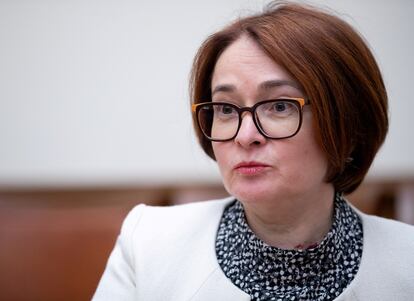Russian central bank warns of production bottlenecks as it struggles with sanctions
The regulator said the economy is facing a massive structural adjustment as borrowing costs soar along with inflation

Russia’s central bank is, for now at least, sticking to the initial decisions it adopted to counter the major crisis triggered by the Ukraine invasion and the ensuing global sanctions.
But it warned about the possibility of supply shortages and runaway inflation. “Companies in many industries are reporting bottlenecks in production and logistics due to the imposed trade and financial restrictions,” said the bank in a statement. Business adaptation to the situation, including restructuring of productive and supply chains, will be “the determining factor in price dynamics in the coming quarters.”
The agency led by Elvira Nabiullina raised interest rates from 9.5% to 20% on February 28, four days after President Vladimir Putin ordered the attack on Ukraine. At its monthly meeting, the central bank decided to keep the rate at this level, and warned it could go even higher depending on inflation, risk assessment and market reaction to the same.
One of the first expected consequences is a significant drop in loans, and the bank said that state lending programs will be key to propping up businesses facing a slowdown in activity as well as higher borrowing costs.
The central bank suspended stock trading on February 25 and over three weeks later it remains closed. Trading in Russian stocks in global markets such as London has also been suspended after these shares lost over 90% of their value.
“The Russian economy is entering a phase of massive structural adjustment,” said the bank in its statement, warning about an inevitable period of great inflation which it hopes to see back down at 4% by the year 2024. A couple of months before the invasion, the official inflation rate was 8.4%, according to the statistical agency Rostat, due to logistical problems arising from the coronavirus pandemic.
Crisis management
For several days it was unclear whether Nabiullina would remain at the helm of the central bank. On Friday, Putin himself handed parliament his proposal to renew her in the post for another five-year term. Nabiullina, whose current term expires in June, took the job in June 2013, under Putin’s turbulent second decade in power.
In this time she has earned a good reputation, and her agency is viewed as one of the few that remain relatively independent from the Kremlin. In close to nine years of service, the chief banker has had to deal with the effects of a global pandemic and with a tsunami of sanctions that began with Russia’s annexation of Crimea in 2014, followed by the war in eastern Ukraine that same year, the poisoning of the spy Sergei Skripal and his daughter in 2018 and of the political opponent Alexei Navalny in 2020, accusations of meddling in the American presidential election of 2016, and now, the invasion of Ukraine.
From one day to the next, Russia watched sanctions put a freeze on $640 billion in gold and foreign exchange reserves, an initiative that even Switzerland has joined. Meanwhile, the Russian central bank has over 2.3 billion tons of gold that cannot find any buyers due to fears of sanctions. In the first three weeks of the war, the ruble lost 30% of its value.
In a video made a week after the start of the war and aired on March 2, the central banker addressed employees to ask them for unity. “Our economy is facing an extreme situation, completely out of the ordinary,” she said, promising to do everything possible to ensure Russia’s financial system and central bank can cope with any shocks.
Tu suscripción se está usando en otro dispositivo
¿Quieres añadir otro usuario a tu suscripción?
Si continúas leyendo en este dispositivo, no se podrá leer en el otro.
FlechaTu suscripción se está usando en otro dispositivo y solo puedes acceder a EL PAÍS desde un dispositivo a la vez.
Si quieres compartir tu cuenta, cambia tu suscripción a la modalidad Premium, así podrás añadir otro usuario. Cada uno accederá con su propia cuenta de email, lo que os permitirá personalizar vuestra experiencia en EL PAÍS.
¿Tienes una suscripción de empresa? Accede aquí para contratar más cuentas.
En el caso de no saber quién está usando tu cuenta, te recomendamos cambiar tu contraseña aquí.
Si decides continuar compartiendo tu cuenta, este mensaje se mostrará en tu dispositivo y en el de la otra persona que está usando tu cuenta de forma indefinida, afectando a tu experiencia de lectura. Puedes consultar aquí los términos y condiciones de la suscripción digital.








































